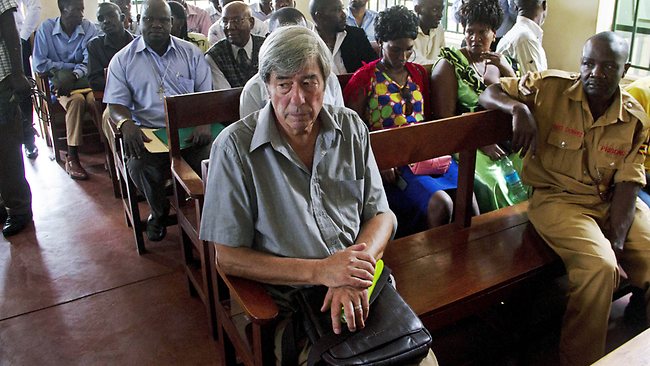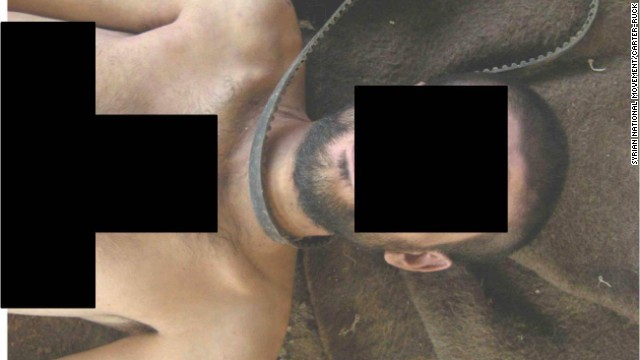Uganda Deports British Man for Videos on Laptop
By: Danielle L. Gwozdz
Impunity Watch News Reporter
KAMPALA, Uganda – A British man who was facing charges in Uganda of possessing a gay sex video is to be deported, a court has ruled.

Bernard Randall, a 65-year-old retired man from Kent, denied a charge of trafficking obscene publications.
Uganda’s government passed the anti-gay legislation in December, punishing homosexuality with life in prison. The President blocked the bill, saying not enough members of parliament were present to ensure a fair vote.
The President can refuse a bill before parliament can force it into law without his consent.
Judge Hellen Ajio has ordered Randall deported within the next 12 hours.
An official from the prosecutor’s office said Randall was being deported because he had “kept on corrupting Uganda’s youth” and had not renewed his visa at this time.
“Lies!” reported Randall, although his lawyer said the ruling would not be appealed.
Randall’s lawyer asked for Randall to have at least five days before leaving the country.
Randall first appeared in court in Uganda in November, would have faced a possible two-year prison sentence if found guilty.
He was charged alongside his friend Albert Cheptoyek, 30, a Ugandan national with whom Randall shares a home with.
Cheptoyek denied the more serious accusation of “acts of gross indecency.”
If Cheptoyek is found guilty, he could serve a possible seven year sentence in prison.
Officials at the court said police would accompany Randall to his home and allow him to collect his personal belongings before escorting him to the airport.
The trial took place in Entebbe, just outside the capital, Kampala.
Cheptoyek told BBC that Randall was being held in the court’s cells awaiting his deportation.
BBC’s Catherine Byaruhanga said Cheptoyek still stood as the trial against both men had not officially started.
Randall was put on trial after thieves stole a laptop from his home.
On the computer was stills of Randall with another man, which were then published in the notorious homophobic tabloid newspaper Red Pepper.
Randall has come out as homosexual after the recent death of his wife of 40 years.
For more information, please visit:
BBC News – Uganda gay sex case Briton Bernard Randall to be deported – 22 January 2014
Gay Star News – Uganda to deport British man on trial for gay sex video – 22 January 2014
The Sun Daily – Uganda court orders deportation of Briton in gay sex case – 22 January 2014
Herald Sun News – Gay Briton Bernard Randall to be deported from Uganda after private pictures stolen – 22 January 2014
Google – Uganda court orders deportation of Briton in gay sex case – 22 January 2014
Report: Syrian Defector Provides Photographic Evidence of the Killing of 11,000 Individuals Detained in Syria
By Kathryn Maureen Ryan
Impunity Watch, Middle East
DAMASCUS, Syria – A report prepared by a group of world renowned war crimes prosecutors and forensic experts documents photographs smuggled out of Syria that provide ‘clear evidence’ of the systematic killing of 11,000 individual detainees by the Syrian regime.

The authors of the report include Sir Desmond de Silva QC, former Prosecutor of the Special Court for Sierra Leone, Sir Geoffrey Nice QC, the former lead Prosecutor of Former Yugoslavian President Slobodan Milosevic, and Syracuse University Professor David Crane, the Chief Prosecutor of the Special Court for Sierra Leone, who indicted President Charles Taylor of Liberia and is the founder of Impunity Watch.
The United Nations and independent human rights groups have documented abuses by both the regime of Bashar al-Assad and armed rebel groups. However, experts say the evidence presented in this report is the most detained documentation of widespread and systematic abuses by either side of the conflict which has raged on for more than 34 months.
Their report is based on thousands of photographs of the bodies of detainees alleged to have been killed by the Syrian regime while in the custody of the state. These photographs provide evidence that would stand up in an international criminal tribunal, according to the report.
Professor Crane called the evidence “a smoking gun.” He added that “any prosecutor would like this kind of evidence — the photos and the process. This is direct evidence of the regime’s killing machine.”
The source, named in the report only as “Caesar” for security reasons, was a military policeman who worked with a Syrian opposition group in secret and later defected and fled the country. In a series of three sessions over the past ten days, they concluded that he was a credible and truthful source and that his account and the evidence he provided was “most compelling.” Caesar worked for the regime as a photographer in the military police. During the civil war, his main job was the documenting “killed detainees” by photographing the corpses of detainees who had been killed while in custody before a death certificate was issued.
Caesar claimed that throughout the conflict he had to photograph about 50 bodies per day. He provided nearly 27,000 photographs for the report. In total about 55,000 such images were smuggled out of Syria.
The report’s authors argue that the fact that these bodies were photographed at the state’s request strongly suggests that “the killings were systematic, ordered, and directed from above,” providing strong, documented evidence of atrocities committed by the Assad Regime. Professor Crane described the images as evidence of a “callous, industrial machine grinding its citizens,” adding that these images depict an “industrial age mass killing.”
The state may have wanted such strong documented evidence of the killing of thousands of individuals by the regime as a means of proving the death of each individual person without allowing the families and loved ones of the deceased to properly bury or even see their bodies, a violation of Islamic law. The report suggest that the documentation of these killings may have also been carried out in order to prove that the state’s “orders to execute individuals had been carried out.”
For the full report please see: Into the Credibility of Certain Evidence with Regard to Torture
For more information please see:
CNN International – EXCLUSIVE: Gruesome Syria Photos May Prove Torture by Assad Regime – 21 January 2014
The Guardian – Systematic Killing Evidence in Syria Just Tip of Iceberg – Aid Agencies – 21 January 2014
The Guardian – US Condemns ‘Horror’ of Syrian War Crimes Evidence – 21 January 2014
The Guardian – Syrian Regime Document Trove Shows Evidence of ‘Industrial Scale’ Killing of Detainees – 20 January 2014
China Prepares to Try Seven More in Crackdown on Dissent
By Brian Lanciault
Impunity Watch Reporter, Asia
BEIJING, China– Approximately seven Chinese activists who advocated for greater rule of law, fairer access to education and other issues are being put on trial this week as the government once again reinvigorates its campaign to stomp out dissent.
The premiere case is scheduled for Wednesday morning in Beijing as lawyer Xu Zhiyong, founder of the loose-knit New Citizens Movement, goes to court on charges of gathering a crowd to disrupt public order.
Xu is the highest-profile activist to be tried since Liu Xiaobo was sentenced to 11 years in prison on subversion charges in 2009. Xu won the Nobel Peace Prize in 2010. Expectations had risen since then that new President Xi Jinping might be more open to free speech, but those hopes have largely subsided, and a media blackout on Xu’s case has left most mainland Chinese ignorant of the proceedings.
Prosecutors allege that Xu and others incited hundreds of people to gather in front of government buildings, train stations, and universities in Beijing in 2012 and 2013. The demonstrators, according to the government, unfurled banners and handed out leaflets regarding education reform and asset disclosure for government officials. The charges carry a maximum penalty of five years in prison.
But it is the wider spectrum of Xu’s activities that have probably alarmed authorities, at least according to analysts and Xu’s close allies. Although Xu has been more cautious in his public statements than Liu, he has encouraged events such as dinner gatherings at so-called “dissident” discourse is permitted.
Feng Chongyi, an associate professor at the University of Technology in Sydney, who studies Chinese political movements, suggested that “They have been talking about a new sort of activism, the need to take new action, not only talk. The security people have made the judgment that they could be facing serious demonstrations. This is a preemptive strike…. They want to take out the leaders and organizers, and send a clear signal that no one is allowed to organize street protests.”
Xu’s rose to prominence in 2003 when he became involved in an unexpectedly successful campaign to abolish rules regarding police detentions of people found without urban residency permits. His Open Constitution Initiative law firm took on several dicey cases, defending the editor of a hard-hitting newspaper and representing parents whose children had been sickened or killed by milk additives. In 2009, the firm was hit with tax evasion charges.
Xu then founded the New Citizens Movement, which he said is aimed at treading “a new path for the Chinese nation, a path toward liberty, justice and love.”
Xu was placed under house arrest in April, detained in July and formally arrested in August. His lawyer, Zhang Qingfang, said he visited Xu on Tuesday morning and that he seemed calm ahead of the trial.
Zhang said he and Xu planned to remain silent throughout the hearing as a means of objecting to what they deem to be an irregular and unfair procedure imposed by authorities. Xu plans to provide a brief concluding statement.
A major concern, according to Zhang, was prosecutors’ decision to hold separate trials for the activists. Prosecutors have also refused to allow witnesses to appear in court and be questioned. Prosecutors had listed 68 witnesses against Xu, Zhang said, but would permit only their statements to be entered into the official record. Zhang’s efforts to bring five defense witnesses to the courtroom were rejected.
“This whole trial is being conducted in a black box, where we cannot actually see the entire process,” he said. “I always hope and strive to represent my clients in a fair trial, but this is not fair, so I will keep silent.”
For more information, please see:
New York Times–In China, a Week Full of Trials over Dissent–21 January 2014
Global Times–Xu Zhiyong set for Wed. Trial–21 January 2014
Voice of America–Prominent Rights Activist Faces Trial in China–21 January 2014
Los Angeles Times–Activists on trial as China steps up campaign against dissent–21 January 2014